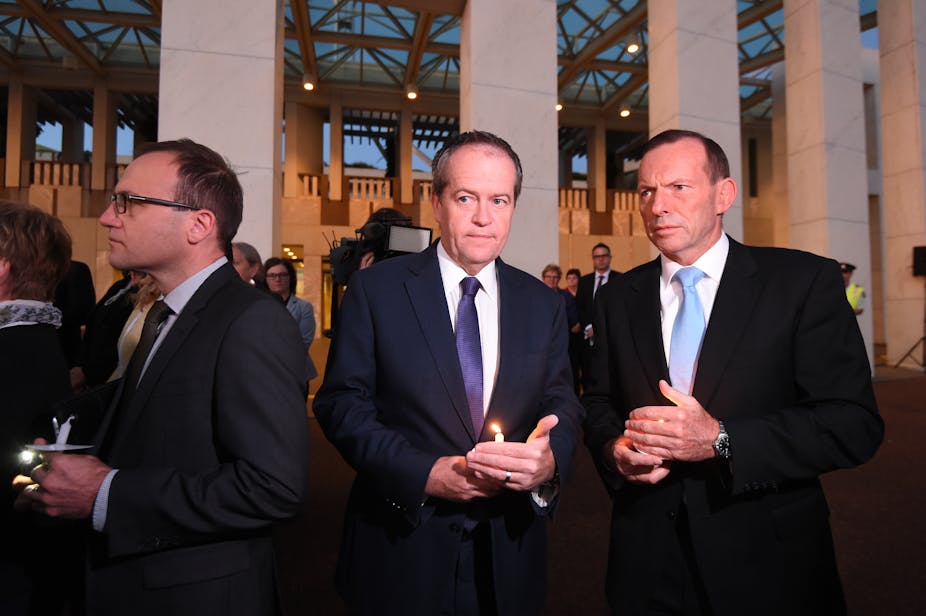Sometimes the way events unfold is so surreal that it’s beyond any normal comprehension. It’s like that in the dreadful heart-wrenching story of Andrew Chan and Myuran Sukumaran.
The countdown goes in slow motion towards what, barring some miracle turnaround by Indonesian President Joko Widodo, is expected to be a tragic end, the timing of which remains uncertain.
It’s punctuated by the occasional glimmer of hope – that somehow mercy might be extended, a way out found, the men’s repentance and good works belatedly recognised. Then hope quickly evaporates.
There have been delays and diversions, complete with macabre details of unfinished preparations for the planned shootings of the Australian pair, together with a number of others convicted of drug offences.
Even for those totally uninvolved it is nerve-jangling. The anguish for the relatives, the mental torture for the men themselves, can’t be imagined.
Leaving aside the repugnant immorality of capital punishment itself, the attitude sometimes displayed in press conferences and comments by the Indonesians has seemed cavalier, as if this were a routine, everyday matter.
Then on Wednesday came the extraordinary spectacle of a full paramilitary operation – including armoured vehicles and fighter jets – to move the unresisting pair from Bali to the execution island.
No doubt this was to make a point to Australia, and for the domestic audience as well. Whatever the purpose, it was truly shocking.
Commenting on the show of force, Foreign Minister Julie Bishop said: “I just cannot comprehend how it is that they could be transferred with so much military equipment and so much security. They’ve never done anything that would suggest they are violent or that they would risk anybody else’s lives.”
The Abbott government has struggled to find something, anything, that might persuade the Indonesians to change direction. It’s been caught between being diplomatic or direct, and struggled with tone.
Tony Abbott on one occasion hit a bad note, when he reminded the Indonesians that Australia had been generous with aid to help after the tsunami, hoping they might reciprocate “at this time”.
It was an unsubtle point; some claimed it would set back the cause of trying to save the men’s lives; the Indonesians chose to take a lot of offence; Bishop had to smooth things over. At other times, the government has gone out of its way to tread lightly.
But now a new stage has been reached. The government is trying every tactic it can, to appeal to, or shame, the Indonesians. It’s not worrying too much about niceties, registering a formal protest over pictures of a police chief posing with each man, the stress obvious on their faces, on their transfer flight, and at the bizarre military display.
As things got more desperate, Bishop this week put on the table a possible trade – Australia would repatriate three Indonesians incarcerated in Australian jails in return for the lives of the Bali two being spared. The idea has received short shrift.
Australia’s efforts is bipartisan. On Thursday, Abbott and Bill Shorten attended together an early morning candle vigil outside parliament. Later, in the house, Abbott, answering a question from Shorten, thanked the opposition leader for their conversations on the subject and the “substantial unanimity that we have achieved”.
Again pitching strong rhetoric, Abbott asked how it could possibly help Indonesia “to go ahead with the executions of the some 60 foreigners now on death row for drug crimes?
"As someone who wants nothing but good for Indonesia – as a government and as a parliament that want nothing but good for Indonesia – we are speaking as one united voice, publicly and privately in every way we can. Pull back from this brink. Do not just realise what is in your own best interests but realise what is in your own best values.”
Both governments are backed into corners.
Any pressure Australia applies raises hackles in the Indonesian government, and among the public in that country. Yet how can Australia not apply maximum pressure?
The authority of new president Widodo is on the line as he talks up the extent of Indonesia’s drug problem. As well, that he is not just dealing with the cases of the two Australians, but other nationals as well, makes it that much harder to give way, even if he wanted to. “We can’t discriminate between people from different countries,” he said this week. Foreigners have been recently shot; there have been strong protests from other countries about those already killed and those set to be.
Bishop said on Thursday: “My gut feeling is that Indonesia would like to find a way to accommodate Australia’s concerns but that they have taken a very hard line approach on this [so] that it’s hard to see how they will change their mind or how we could achieve a change of heart.”
Assuming the executions go ahead, Australia will then have to manage the aftermath.
The government has indicated there would be some reprisals (a major trade delegation has already been postponed) but it is unlikely Australian ambassador Paul Grigson would be withdrawn.
Having recently rebalanced relations after the revelations of Australian spying on top Indonesian figures and the tension over the turn backs of boats, and now faced with a new president, the Abbott government does not want the latest fracture in relations to become an ongoing rift. “We want the best possible relationship with Indonesia and our relationship with Indonesia must continue regardless of anything that might happen in the next few days,” Abbott told parliament.
But this affair will be remembered a long time for its sheer human ugliness.
Listen to the newest Politics with Michelle Grattan podcast, with guest, Shadow Communications spokesman Jason Clare, here.

